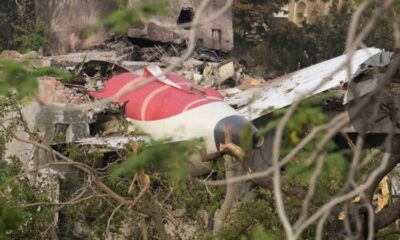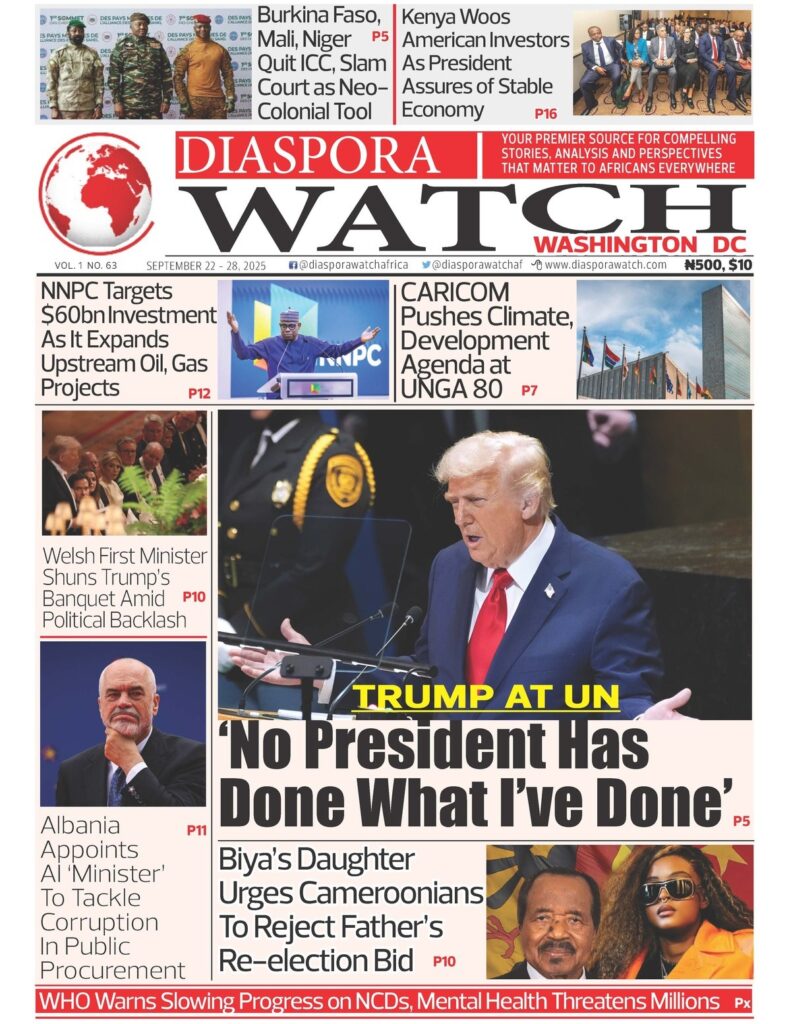Trending
DIASPORA WATCH, Vol 1, No. 12
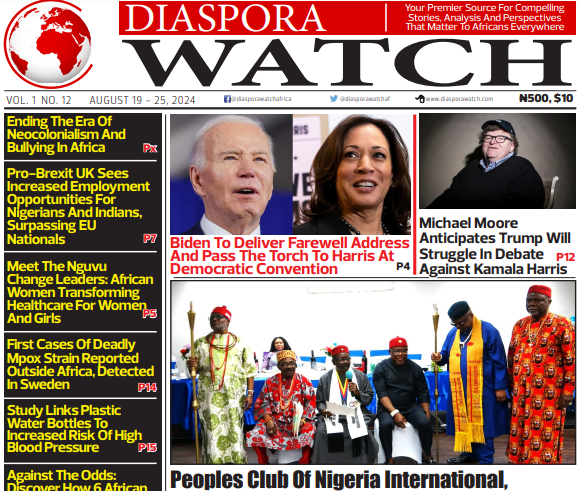
Diaspora Watch: 12th Edition
SUBSCRIBE TO DIASPORA WATCH NOW ON THE BELOW LINK !!!
The Countdown to November: Unpacking the US Presidential Election
In this thrilling 12th edition of Diaspora Watch, we delve into the latest developments shaping the US Presidential Election landscape. President Biden prepares to pass the torch to Kamala Harris at the Democratic Convention, while Donald Trump seeks to delay his sentencing until after the election. The Vice Presidential candidates have agreed to debate on October 1, promising a fiery exchange.
A Ghanaian king has made a surprising request to speak at a Trump rally, while the Peoples Club of Nigeria has successfully launched in the US with an induction in Gainesville. Meanwhile, a US Court has dismissed Nigeria’s Sovereign Immunity Claim in a $70 million arbitration with a Chinese firm, raising questions about international relations.
In Africa, Senegal has achieved a major scientific milestone with the launch of its first satellite, GAINESAT-1A. And in healthcare, a group of women known as the Nguvu Change Leaders are transforming healthcare for women and girls across the continent.
In our special features, we shine the spotlight on:
– Ugochi Uwahemo, a dynamic dancer who is taking the world by storm with her captivating Igbo-inspired dance moves.
– Six remarkable African CEOs who have defied convention and reached the pinnacle of their careers without formal education, inspiring millions with their stories of determination and success. These trailblazers are redefining what it means to be a successful leader and proving that innovation and hard work can triumph over traditional paths to success.
This edition is packed with in-depth analysis, exclusive insights, and captivating stories. Stay informed, engaged, and inspired with Diaspora Watch. Join the conversation and stay ahead of the curve!
Our diva page features the amazing US-based Dr. Tina Fubara.
Stay informed about the diaspora community. Read DIASPORA Watch now!
Don’t miss out on these and more exciting stories in the new edition of Diaspora Watch. Rush to get your digital or hard copy today and stay ahead of the curve!
Our Diva page features the amazing Maureen Obih, a Mental Health Nursing graduate from Southampton Solent University.
Get your digital or hard copy of Vol. 12 now and join the conversation!
Get Your Copy of Diaspora Watch Today!*
Don’t miss out on this packed edition! Get your copy of Diaspora Watch now and stay informed about global news, events, and inspiring stories from the African diaspora.
Hard Copies Available in the USA and Nigeria
Digital Version Available on Our Platforms Worldwide
Happy reading!
Boniface Ihiasota Diaspora Watch News Paper Weekly
Publisher…
About Diaspora Watch
Diaspora Watch is a weekly news publication of Excel Global Media Group.
Address: 600 Massachusetts Ave NW, Suite 228 C, Washington, DC 20001 USA
Email: info@diasporawatch.com
USA Call Center: +1-281-846-6442
Maryland Phone: +1-443-824-6219
Houston Phone: +1-832-483-4864
Washington DC Phone: +1-202-449-0797
Nigeria Phone: +234 803 389 9184
Facebook: https://www.facebook.com/diasporawatchafrica/
X (formerly Twitter): https://x.com/diasporawatchaf
IG: https://www.instagram.com/excelmagazineinternational/
Diaspora Watch website: https://diasporawatch.com/
Excel Global Media Group Website: https://excelglobalmediagroup.com
Diaspora
Diaspora Watch Vol. 63

Diaspora Watch Unveils 63rd Edition: A Global Mirror of Power, Politics and People
Diaspora Watch Vol. 63 FREE Digital View: https://diasporawatch.com/3d-flip-book/diaspora-watch-vol-63/
On Demand Print: https://www.magcloud.com/browse/issue/3172875?__r=1069759
Subscribe to Diaspora Watch Now on the link below!!!
https://diasporawatch.com/subscribe-to-diaspora-watch-newspaper/
The 63rd edition of Diaspora Watch Newspapers has hit the stands this week, bringing readers a compelling mix of global power plays, continental shifts, economic pursuits and cultural flashpoints.
From New York to Niamey, London to Lagos, the edition offers a panoramic view of unfolding events shaping the world and Africa’s place within it.
On the cover, U.S. politics takes centre stage as President Donald Trump, addressing the United Nations, boldly declares: “No President Has Done What I’ve Done.” In a dramatic twist on African geopolitics, Burkina Faso, Mali and Niger jointly announce their withdrawal from the International Criminal Court, condemning it as a “neo-colonial tool.”
Kenya’s President turns to America’s corporate giants, assuring investors of stability in a pitch to attract capital inflows. Nigeria equally seizes the moment, with the NNPC outlining ambitious upstream oil and gas expansion plans targeting $60 billion in investment. Across the Caribbean, CARICOM leaders rally at the UNGA 80, pressing hard for climate justice and a development agenda that cannot be ignored.
Europe is not left out of the storm: the Welsh First Minister pointedly shuns Trump’s banquet, fueling political ripples back home, while in Africa, Cameroon’s political dynasty faces unusual pressure as President Biya’s daughter openly calls on citizens to reject her father’s re-election bid. Elsewhere, Albania breaks new ground with the appointment of an AI “Minister” to combat corruption in public procurement — a move being hailed as futuristic governance.
On the health front, the World Health Organization issues a sobering warning, noting that slowing progress on non-communicable diseases and mental health is putting millions at risk globally.
Sports enthusiasts will find gripping drama on the back page, where Manchester United’s crisis-hit boss lays down the gauntlet with a blunt declaration: “My way or no way.”
Diaspora
Diaspora Watch Vol. 62

Diaspora Watch 62nd Edition Is Here!
Diaspora Watch FREE Digital View: https://diasporawatch.com/3d-flip-book/diaspora-watch-vol-62/
On Demand Print: https://www.magcloud.com/browse/issue/3172869?__r=1069759
Subscribe to Diaspora Watch Now on the link below!!!
https://diasporawatch.com/subscribe-to-diaspora-watch-newspaper/
The 62nd edition of Diaspora Watch Newspapers is out, delivering a hard-hitting blend of global politics, African affairs, diplomacy, business, health, and culture, with stories that cut across continents and shape conversations.
Leading the cover is a riveting headline from London, where Donald Trump’s UK visit takes a dramatic turn as he sidesteps the brewing Mandelson–Epstein controversy, raising eyebrows in diplomatic and media circles alike.
In the Middle East, Saudi authorities have freed three Nigerian pilgrims detained over alleged drug trafficking, bringing relief to families back home. On the domestic front, Labour Party’s Peter Obi lambasts President Tinubu over plans for emergency rule in Rivers State, stoking fresh political debates.
The global economy also takes centre stage: the United Kingdom secures a massive £150 billion U.S. investment as Prime Minister Keir Starmer and Donald Trump strike a landmark tech deal. Meanwhile, South Sudan is plunged deeper into crisis as President Salva Kiir suspends his deputy, Riek Machar, and accuses him of treason.
In Asia, U.S.-China tensions flare once again as Beijing slams Nvidia with monopoly breach accusations, just as both nations resume sensitive trade talks. Public health makes headlines with the World Health Organization’s grim report of a 50% surge in global cholera deaths. From Europe, Spain introduces disaster preparedness lessons for children, a move hailed as a pioneering approach to climate resilience.
The Caribbean bloc, CARICOM, issues a firm condemnation of Israel’s strike on Qatar, insisting on respect for international law. In the energy sector, the United States oil industry struggles as job losses mount and companies slash spending amid sliding prices.
On the cultural front, Hollywood dazzles as Brad Pitt and The Studio emerge dominant at the 2025 Emmy Awards, sealing their place in entertainment history.
With fearless reportage and bold editorial framing, Diaspora Watch continues to provide the diaspora community with sharp insights and global perspectives, reinforcing its position as the voice of Africans abroad and a trusted lens on world affairs.
The 62nd edition is available now in print and digital formats.
Diaspora
Diaspora Watch Vol. 54

Dive into the latest edition of Diaspora Watch, a premier publication dedicated to sharing the stories and experiences of the global diaspora community!
The 54th edition promises to be a riveting read, packed with thought-provoking articles, in-depth analysis, and expert insights on pressing topics affecting Africans globally.
Diaspora Watch FREE Digital View: https://diasporawatch.com/3d-flip-book/diaspora-watch-vol-54/
On Demand Print: https://www.magcloud.com/browse/issue/3125894?__r=1069759
SUBSCRIBE TO DIASPORA WATCH NOW ON THE BELOW LINK !!!
https://diasporawatch.com/subscribe-to-diaspora-watch-newspaper/
This edition covers a range of timely and impactful stories, from cultural missteps to global economic shifts. You’ll find in-depth coverage of former Nigerian President Muhammadu Buhari’s passing in London, the US shifting focus to trade in Africa, and Pacific Island Nations leading the charge in climate action.
Other highlights include Governor Soludo’s engagement with Ndi Anambra in the US, celebrating 52 years of CARICOM’s regional integration and cooperation, and Barcelona’s payment to Messi in deferred salary.
Some of the key stories you’ll encounter include:
Trump’s recent comments on Liberian President’s English ability have sparked debate, Kenya is in turmoil with opposition demands for the President’s resignation, and the Trump administration is pushing Africa deportation deals.
Meanwhile, ICE has arrested dozens of convicted criminals in a nationwide operation, and the US State Department has cut over 1,300 jobs in mass layoffs.
Whether you’re interested in news, politics, or culture, the 54th edition of Diaspora Watch has something for everyone.
Stay connected with the world around you – read Diaspora Watch today!
Celebrating African excellence and spotlighting pressing global issues.
#DiasporaWatch #AfricaInFocus #GlobalNews #CulturalVoices #AfricanPerspective
-

 News1 week ago
News1 week agoInsecurity: US Spy Plane Begins Operations in Nigeria
-

 News1 week ago
News1 week agoTinubu Sends 32 Additional Ambassadorial Nominees to Senate for Confirmation
-
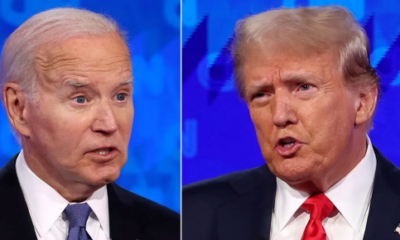
 Politics7 days ago
Politics7 days agoUS Shooting Sparks Controversy Over Afghan Vetting as Trump Blames Biden
-

 Analysis1 week ago
Analysis1 week agoAs G20 Moves On Without America, by Alabidun Shuaib AbdulRahman
-
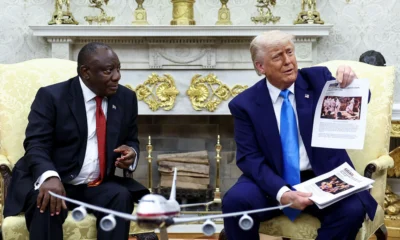
 News1 week ago
News1 week agoUS–South Africa Rift Deepens Over G20 Boycott and Diplomatic Snubs
-
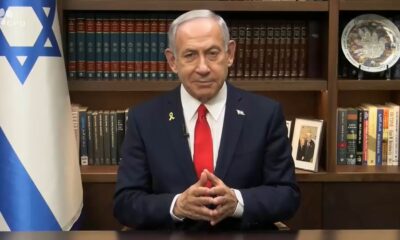
 News1 week ago
News1 week agoIsraeli PM Netanyahu Seeks Presidential Pardon Amid Ongoing Corruption Trials










